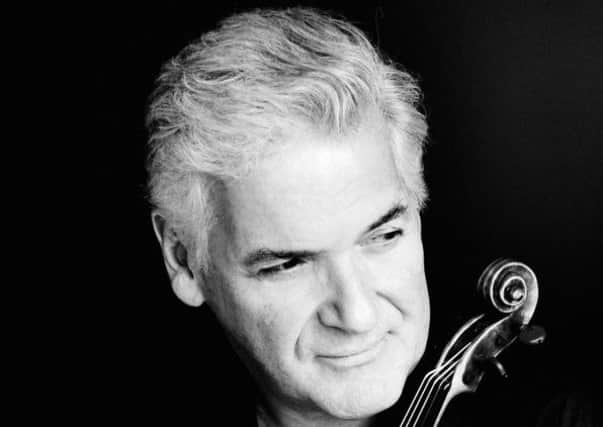Pinchas Zukerman’s NAC orchestra makes return


Several weeks ago, Pinchas Zukerman directed and performed in his final annual fundraising gala for the National Arts Centre (NAC) Orchestra in Ottawa, where he has been music director for the past 16 years, a role he will step down from next year.
The glitzy event – for which he was joined by his virtuoso friend, violinist Itzhak Perlman – raised $917,000 (£511,000), the purpose of which is to fund the NAC orchestra’s work, especially its pioneering education programme which Zukerman introduced early on in his tenure to help young instrumental talent realise its true potential.
Advertisement
Hide AdSchemes such as this aren’t unique, but Zukerman is: both in terms of his long-held reputation as a virtuoso soloist on violin and viola, and in terms of the dedication and charisma that helped him convince the orchestra’s board to allow it all to happen.
We’ll see proof of that this week, when the NAC orchestra makes a return visit to Scotland, this time at the Usher Hall for a concert celebrating the role of Canadians in the First World War, in which Zukerman will conduct music by Vaughan Williams, Beethoven and John Estacio. He will also play and direct Bruch’s famous Violin Concerto.
Within the orchestra’s ranks are leading young players who owe their place in the musical world to Zukerman’s vision and determination when, a generation ago, he forced the NAC board’s hand. “When I first came, they were bringing 50 or 60 kids into half a dozen open rehearsals each year. Most orchestras were doing the same thing,” Zukerman explains. “Pretty routine stuff.”
He had bigger ideas of his own. “I had three aspects I wanted to create; firstly with the orchestra itself, which was a 46-piece band and really too small to cover the whole gamut of symphonic music. I wanted it to tackle everything: Bach, Mozart, the meat and potato repertoire of the Romantics, and of course, new music.” It wasn’t too long before the NAC orchestra was operating at its current level of 60-plus players. With that sorted, Zukerman felt he had the right vehicle to expand the educational work. “People talk about ‘outreach programmes’, but that was misleading, I think. What does it mean? You go out 50 miles to play to some community? That’s not enough, so we started calling it Youth Education, the core of which became the Young Artist Programme, now known as the Summer Music Institute.”
Nowadays the scheme, which runs for four weeks, has more than 90 youngsters learning a wide range of orchestral instruments. “We’ve had phenomenal results, with dozens of players from the early years of the scheme now leading orchestras, playing in quartets, or teaching. That generation is taking over in many parts of the musical world.”
Zukerman insisted the project be international in scope. “That was my first big argument with the board. They wanted only Canadian students. I said ‘what the hell are you talking about? What’s all this Canadian stuff? Forget it, forget the programme.’ Then I walked away from the table.” They called Zukerman back and he got this way.
Advertisement
Hide AdBut that wasn’t the extent of Zukerman’s internationalist vision. He was also keen to use the orchestra’s expanding touring schedule to extend the reach of its educational work. “When we go on tour, we now hold around 50 to 60 classes in the cities we visit. We connect with the school system in these places, and our musicians go in and work with kids. So our tours are no longer just about playing concerts, but leaving little seeds as we go.”
The focus of such work during the orchestra’s current UK tour is in London with the Royal College of Music. “Students from the RCM have been at our courses in Canada, and will play with us in London,” he says. “These coalitions in the arts are so important in order for us to sustain things financially.” Zukerman is also using his position as principal guest conductor of the Royal Philharmonic Orchestra to cement relationships between that orchestra and the RCM.
Advertisement
Hide AdThe third aspect of his vision for the NAC was to implement a video conferencing programme of teaching. “I first saw it in action 20 years ago, and immediately saw it as an invaluable tool to enhance instrumental teaching.”
So when did the teaching bug hit Zukerman, who also holds a professorship at New York’s Manhattan School of Music? And why does he see it as an important part of the solo performer’s make-up? “I took to teaching at an early age,” he says. “I saw it as a key component in helping me explain things in different ways, both to myself and others.”
At this point he can’t resist an anecdote. “When I was 24 and working with the English Chamber Orchestra in Brighton, I said to [the then leader] Alan Sillitoe, why don’t we get some young ambitious players to come down here and hold classes for them? We did, and one of the first applicants was the young violinist called Peter Oundjian [who is now music director of the RSNO].”
“He was chosen, and the bugger was so keen, he wouldn’t leave me alone for the entire course. I just wanted some time alone! But I did recommend to his father that, if he had the means, he should audition for the Julliard and study with Dorothy DeLay, and sure enough that’s what he did. I love to see that kind of talent flourishing.”
It’s all about having a generous spirit. Which is precisely what Zukerman brings to every aspect of musical life he touches. Savour it on Thursday.
• Pinchas Zukerman and the National Arts Centre Orchestra of Canada are at the Usher Hall on 23 October, www.usherhall.co.uk